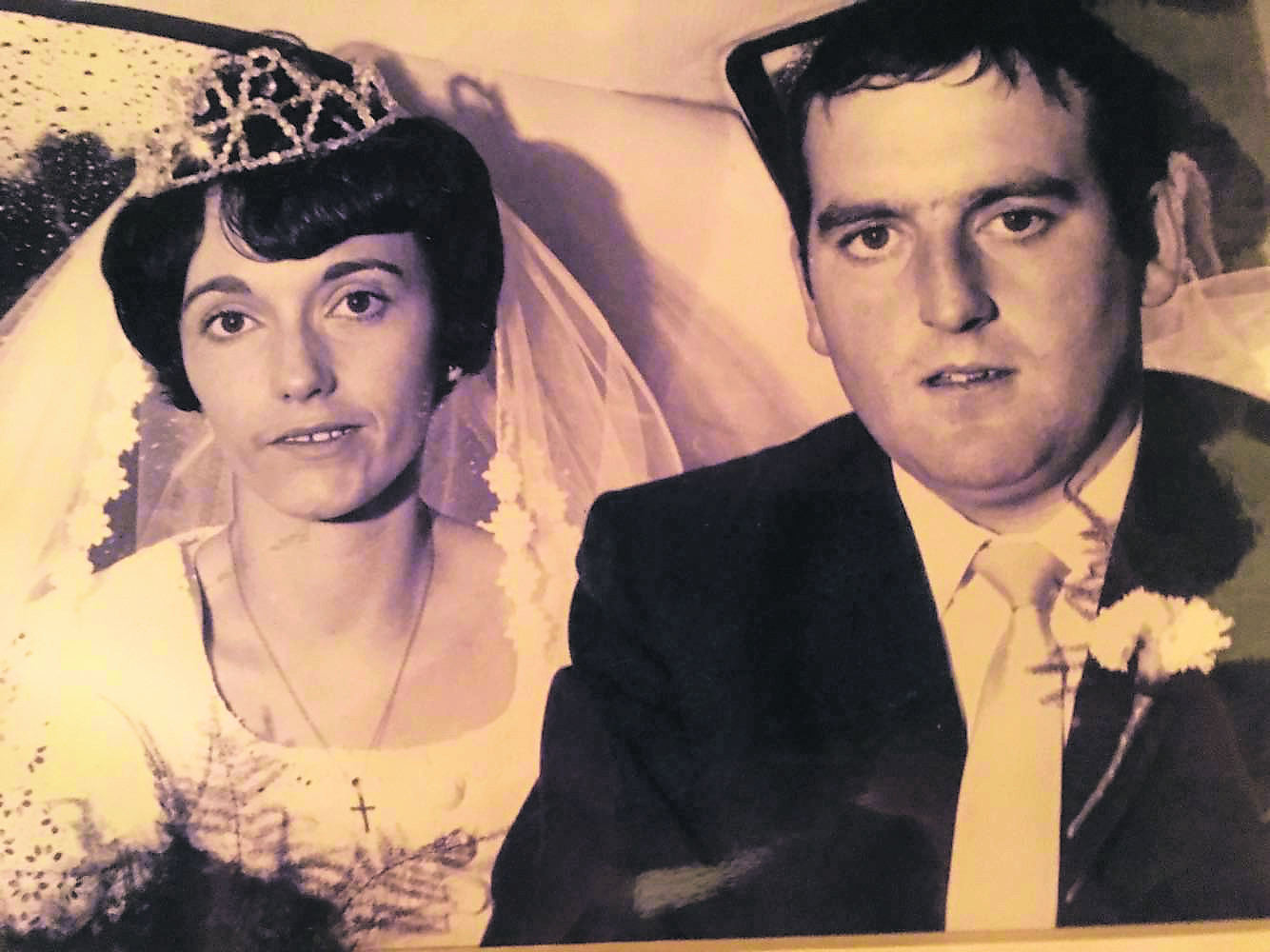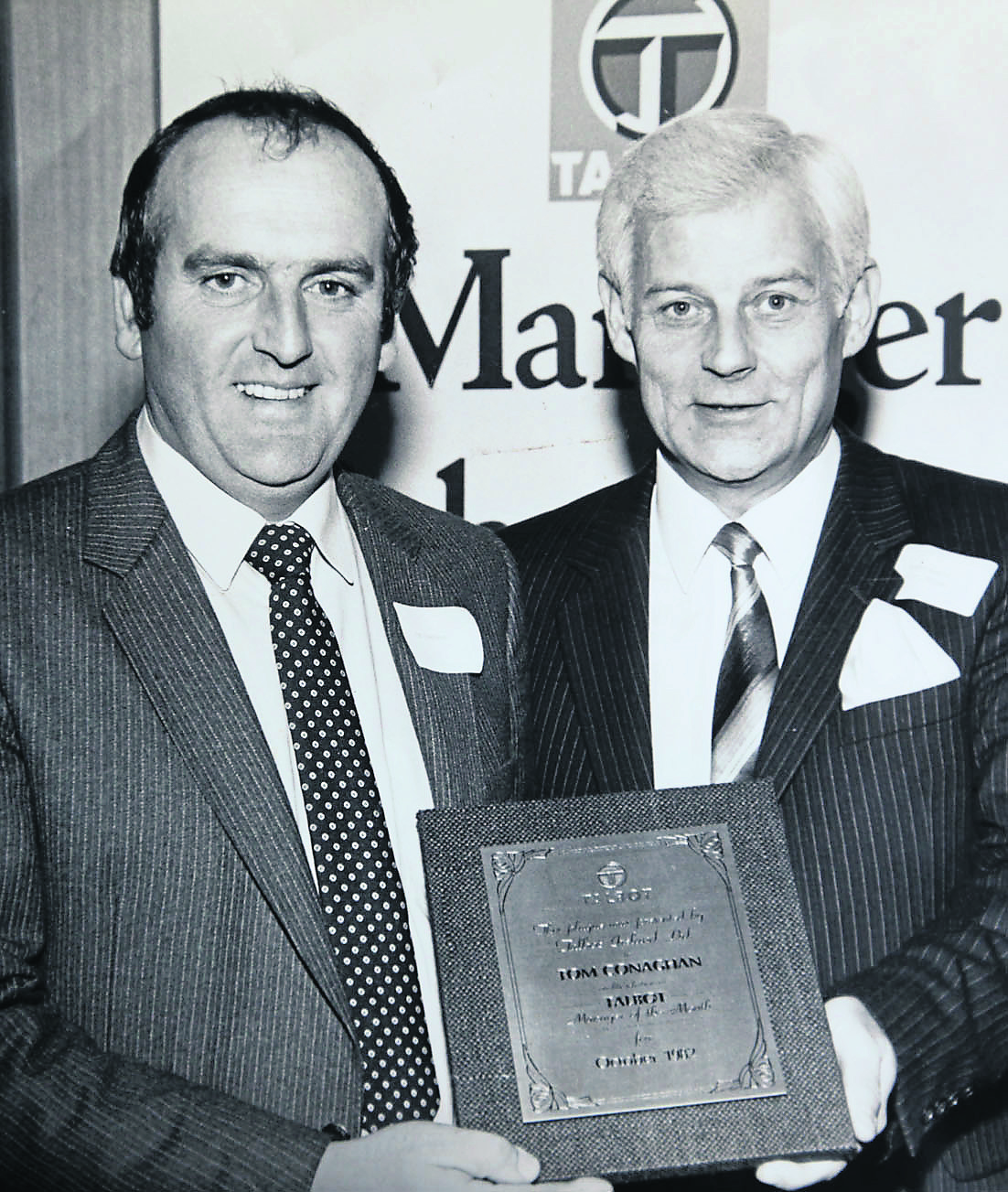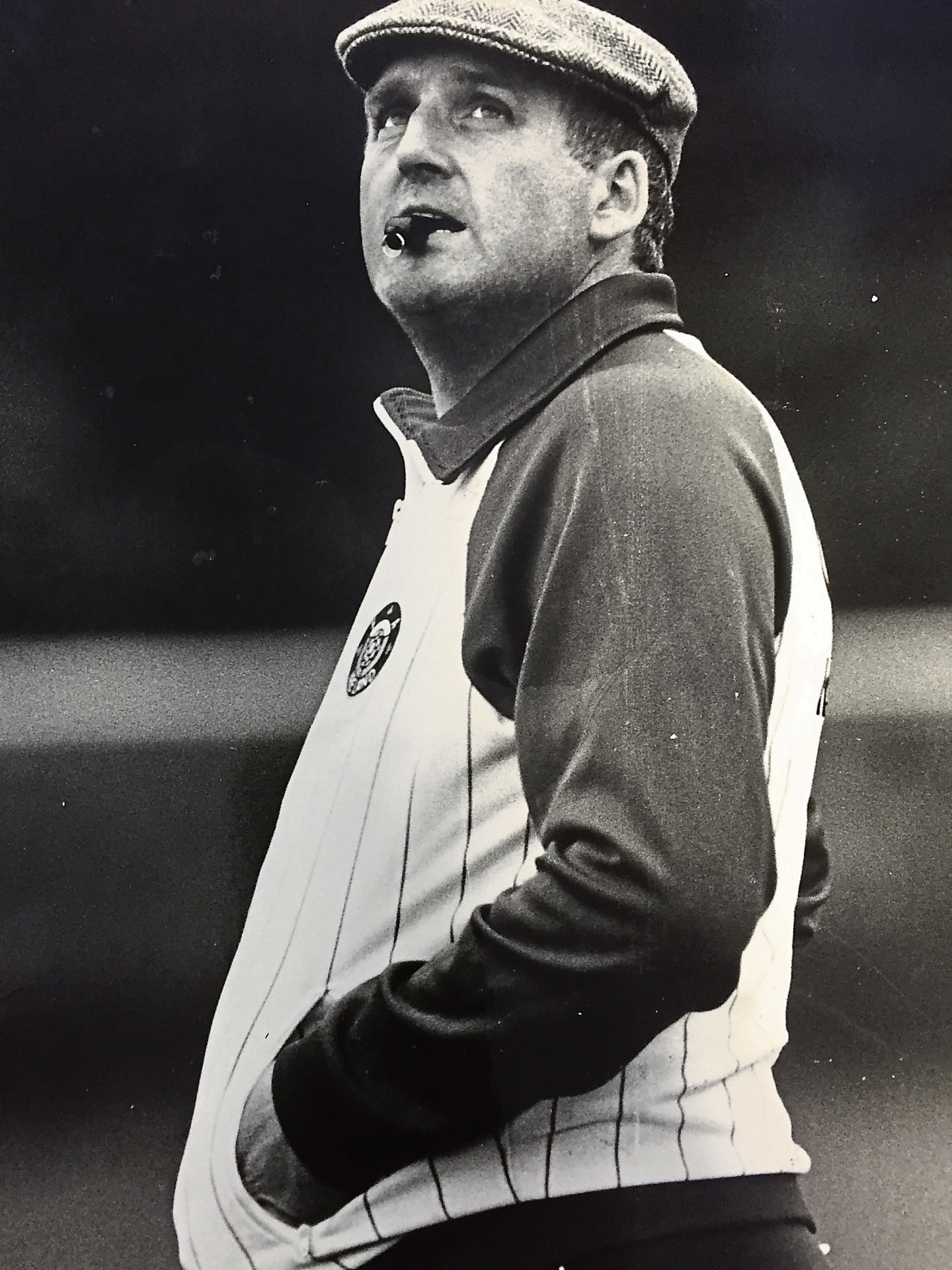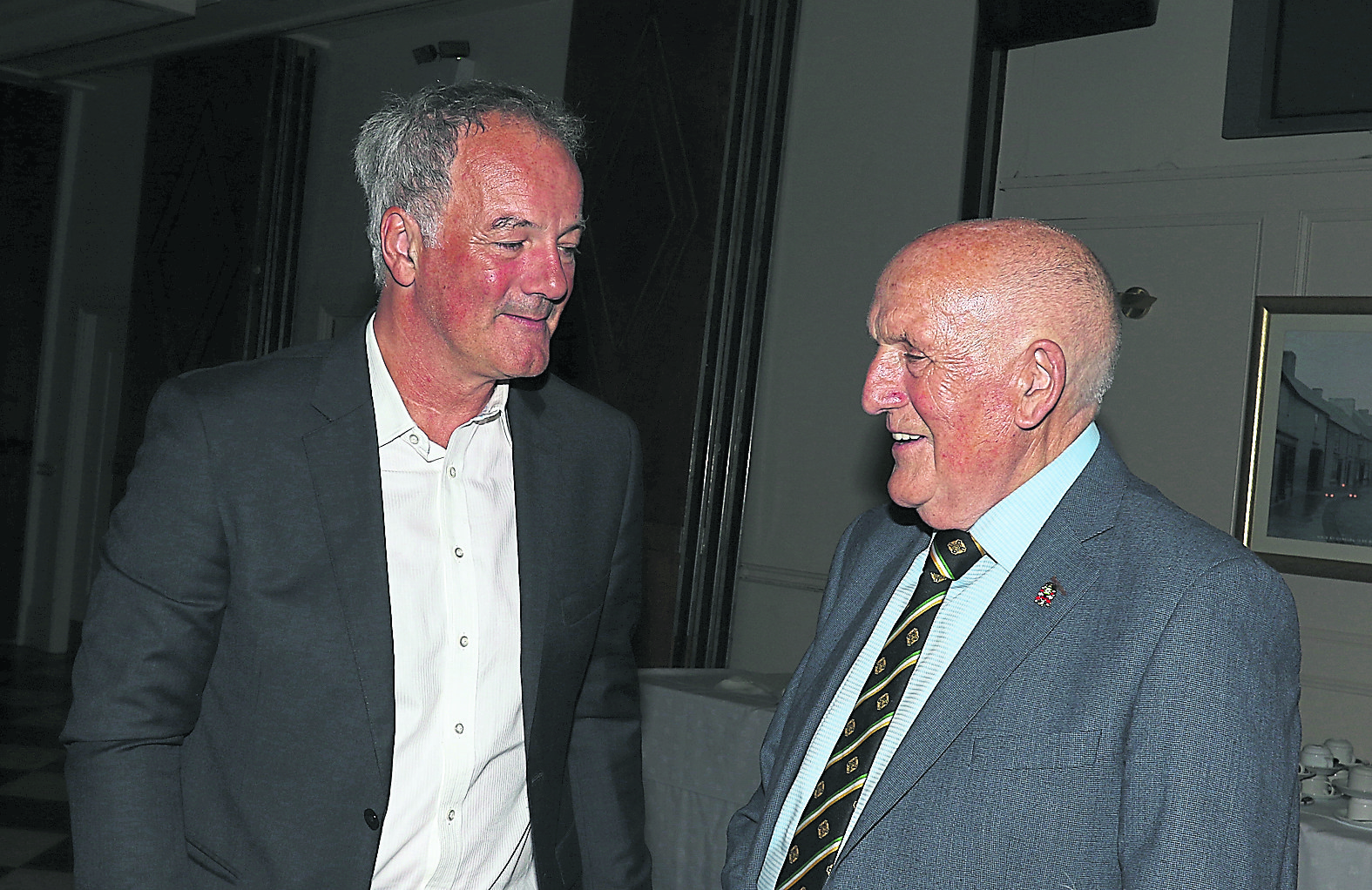
Former Donegal manager Tom Conaghan
In the front room of the Conaghan household in Donegal Town, there’s a large painting of a young boy hanging on the wall that Tom and his wife Celine hold close to their hearts.
Even now, almost 40 years on, not a day goes by when that smiling boy named Kevin, who’s sporting a Nike t-shirt with short black hair, doesn’t enter the minds of his parents who loved him dearly.
The eldest of the three Conaghan children and the only boy in the family, Kevin – 14 years old at the time – was tragically killed on December 23, 1984, in a car accident before being buried on Christmas Day two days later.
Now four decades later, as Tom prepares to be inducted into the Donegal Sporting Hall of Fame this weekend in the Mount Errigal Hotel for his lifetime’s work in GAA, there’s no doubt in anyone’s mind that if there’s one person he would want by his side when accepting his award, it would be a son that was taken from him too soon.
“I know in life you have to try your best to deal with it in your own way, but it’s still very hard,” Conaghan says.
“We drove past the Abbey Hotel last Christmas, and I couldn’t believe it was 39 years since my family and I were sitting there for a funeral lunch. Life goes in the blink of an eye.
“I love sport and I love what I do in politics, but for obvious reasons, at Christmas, all that goes out the window.
“Kevin was a loving son. He was kind, intelligent and very fond of football. You might say he was an old head on young shoulders. He was as big of a man at 14 years of age than I am now, or I ever was.
“I was honoured to be given two pictures last Christmas in one frame from the St Naul’s club of my son Kevin and my grandson Kevin Rose, both playing football. It brought back a lot of memories and it’s something that’s really special to me and my wife Celine.”
If ever there were examples needed to highlight that some things in life are bigger than sport, then this was one of them.

Through the highest of highs to the lowest of lows in sport, and even to this day in politics, you would assume there might not be much more to learn about the Independent county councillor.
But Conaghan’s career could almost be categorised as a life with very substantial sliding door moments.
His time in football management may only be a slice of the pie chart of his life now, given all his other involvements and experiences.
By the end of 1980, Four Masters were a coming-of-age team, having won their first-ever U-21 championship the year before under the guidance of Donegal’s second-ever All-Star Donal Monaghan.
A new era needed a new direction in management and discipline. The club didn’t have to look very hard.
“I would’ve had no interest in management,” Conaghan says. “I was involved in athletics coaching in the town but had no knowledge of how to organise a GAA team. It was only when Donal came to me and said that I’d be the man for the job, that I was hooked.
“More than anything I wanted to see Donal win a championship medal before he retired. We both shared the idea of Four Masters being regarded as the best team in the county.
“I agreed to take the job on the condition that things were going to change in the way players trained and conducted themselves. I knew I had to bring something different to the team. I think without Donal as my sounding board, I would never have been as successful.”
The resulting years had his name indelibly linked with Donegal and Four Masters football throughout the 1980s.
A fierce disciplinarian and firebrand in equal measure who rallied against the common status quo trend seen in the county for so long. He stamped down on any special treatment given to players, thus commanding unequalled respect in the dressing rooms he inhabited.

Conaghan’s legendary training sessions were seen, even now, as excessive and often immoderate. His managerial demands, often brutal and severe, where a player could be punished for being no less than a minute late for the team bus or as the then manager called it “not meeting the required measurements of an inter-county player”.
A standard and fair punishment in today’s modern GAA, but in the 1980s, it was unheard of. You could say he was a man ahead of his time.
“Did I make mistakes? Perhaps. But I have no regrets about those decisions. Everything I learned from management came from people like Donal, Michael Lafferty and of course Mick O’Dwyer - real winners in the game,” says Conaghan.
“Micko was one of the first people I contacted when I first went into management. He always emphasised the importance of training on time, working hard, and the fact the buck stops with me. Keeping control and standards high were key.
“I know sometimes I could’ve been severe with the discipline because players don’t often like change, and I accept that, but I wanted to win something for the team and that was the only way I knew how to do it.
“As a result, you might not be the best of friends with everyone that played for you, but I can say with certainty that the players I had, maybe despite our differences, always gave 100 percent to the team.”
The end product resulted in two county championships with Four Masters in ‘82 and ‘84 and of course Donegal’s first ever All-Ireland championship in 1982 with the county’s U-21 team.
A lifelong teetotaler, he seemed to live by the simple management philosophy of, the harder his teams worked, the luckier they seemed to get.
As faith would have it, both his inter-county managerial positions came at the hands of a phone call from the county board, first in early 1982 with the U-21s and again in late 1986 when the top coaching job in Donegal came calling, two years after departing the club scene.
“I never applied to be an inter-county manager, both times I was proposed by the clubs in Donegal. I think the county board saw what I did with Four Masters and thought I could bring a bit of success to Donegal.
“I always had a good relationship with the county board. They probably disagreed with me when I would drop a certain player from the panel. They would’ve felt I was being a bit drastic. I would get calls from individuals to recall a player to the team, but my attitude was always the same; ‘I pick the team, you don’t’.
“Particularly after Kevin died in 1984, I stood down as Four Masters coach. I needed a break from it all, but I soon realised you can use sport as a distraction or as a way to throw your energy at something. So, when the senior county job came along, I was very keen to go for it.”
Mindful he didn’t have a background as an inter-county player, Conaghan was forced to compensate through his passion and dedication for the team. He tells the tale how, on one occasion, after receiving surgery in hospital on both hands for arthritis, and the players expecting his absence from training, Conaghan landed in the centre of the team huddle with both hands wrapped in bandages to the players' surprise.

He even went as far as driving to Baker’s Corner nightclub in Killygordon to observe which members were drinking or partying during the inter-county season after they told the manager that they were merely meeting up for a coffee after training in Donegal Town.
“I had to think outside the box an awful lot with Donegal. Beforehand the team would train two nights a week on Tuesday and Thursday. So, I thought, why not give ourselves an advantage by training three nights a week on Monday, Wednesday and Friday,” Conaghan adds.
“Most teams I would’ve taken over in my time as manager were always in the doldrums, so you couldn’t afford to be soft on players. We went from Division 3 to Division 1 in two years.
“The way I sometimes handled players would’ve been hardest probably on my wife Celine, because she knew the players I often had to punish, and she would’ve known their families.
“She tells the story of travelling on the supporter's bus to Kerry one weekend and Joyce McMullin, who I dropped off the panel a short time before that, sat down next to her on the bus, to her embarrassment.
“But one thing about it was, no matter what rule a player broke, they were always welcomed back with a clean slate, and Joyce, being the character that he was, came back into the team, worked hard and never held a grudge.”
But despite the teacher-student-esque relationship with his teams, Anthony Molloy in his book Life, Glory and Demons, highlights a very different side and character to the Donegal Town man, which Conaghan himself outlines.
“I always had a different relationship with Anthony,” Conaghan adds. “I think management has to be about understanding different people, particularly when they have problems.
“I saw Anthony as the leader of that team. He was a different guy to everyone else. He was an amazing person who always supported me as manager and believed in what I was doing. So, I felt it was my job to try and guide him and many others, as best I could, through good times and bad.”
A trophyless three-year period as senior manager saw one Ulster final in 1989 which Tyrone won after a replay. However, the perception that persistent conflict with a number of key players, saw them absent from the panel and was deemed the definitive reason for losing the ’89 final.
A review of Conaghan’s tenure followed in what he described as his first “political election”, where he was challenged for the position of manager by Brian McEniff.
“An awful lot of the senior players asked me to stay on as manager, as did the county board, but when Brian put his name in the hat, it had to go to a club vote,” Conaghan states.
“If I knew it was going to turn out the way it did, I don’t think I would’ve reapplied for the job. There was a lot of campaigning going on at the time, which I don’t think was right and yet, I only lost by one vote.
“I suppose myself and Brian wouldn't have seen eye-to-eye around that time, but he was perfectly entitled to go for the job and ultimately achieved what only two people in this county achieved, and that was winning Sam Maguire. I meet Brian often and we get on great now.”
Time has certainly passed since those post-1992 days. He had offers from other clubs and counties, taking over as Sligo boss for a brief period, but it never felt right for him.

A warm welcome into the political jungle followed in 2014 after serving as mayor of Donegal Town.
His sporting life is long over as he takes a back seat watching the next generation of talent come through the local area, one being his grandson, Kevin.
He will always carry the distinction of being the manager who brought Donegal’s first All-Ireland to the hills. An achievement worthy of a Hall of Fame award.
Through good days and bad, both personal and professional, Conaghan always demanded the best from his players and colleagues and even at the age of 78, the ambition for greater challenges still drives him on as it always has.
“With everything that’s happened in life, I still love a challenge, I’m always hungry for more. My wife Celine and my children Emer and Lisa think it’s time for me to start slowing down. We’ll have to wait and see.”
Subscribe or register today to discover more from DonegalLive.ie
Buy the e-paper of the Donegal Democrat, Donegal People's Press, Donegal Post and Inish Times here for instant access to Donegal's premier news titles.
Keep up with the latest news from Donegal with our daily newsletter featuring the most important stories of the day delivered to your inbox every evening at 5pm.